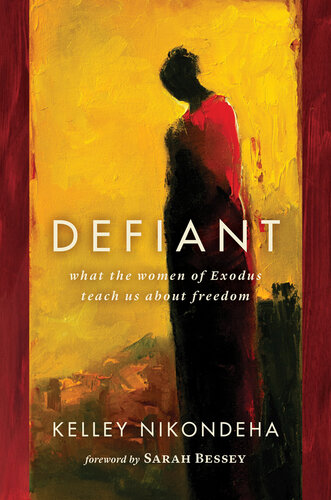
Defiant
What the Women of Exodus Teach Us about Freedom
کتاب های مرتبط
- اطلاعات
- نقد و بررسی
- دیدگاه کاربران
نقد و بررسی

February 3, 2020
Theologian Nikondeha (Adopted) explores in this accessible work of biblical exegesis the stories of women in the book of Exodus, asking what their lives can teach about the spiritual mandate to work for justice. Each chapter focuses on a particular woman or women, such as Shiphrah and Puah, the midwives ordered by a pharaoh to kill male babies born into Hebrew families; Bithiah, daughter of the pharaoh; or Miriam, sister of Moses, all of whom the author describes as “liberation practitioners.” Nikondeha places biblical narrative in historical context and interweaves stories from her own life and other examples of present-day women working for justice. For example, the chapter on Moses’s mother, Jochebed, situates Jochebed’s pregnancy and decision to relinquish her son against the backdrop of Egyptian politics during biblical times and the racial politics of reproduction under apartheid in South Africa. This empowering work will do well in a Sunday school or book group setting.

February 1, 2020
Having developed within patriarchal societies, many dynamics within the biblical narratives have yet to be fully understood. Nikondeha, codirector, communities of Hope and author of Adopted: The Sacrament of Belonging in a Fractured World, examines the liberation story of Exodus, and finds tales of resistance within whose structures can still be found today among marginalized groups. Each chapter can be best described as a midrash that focuses on one woman or a group of women (e.g. the midwives, Shiphrah, and Puah). This imaginative recreation brings readers into that hidden landscape and relates these acts of quiet resistance, attention, and subversion to those of women and other marginalized persons. Nikondeha makes connections to the civil rights movement and the Israeli-Palestinian conflict, but many are from her own experiences, whether as development worker with the Batwa tribe in Burundi or the tension of her privileged white evangelical upbringing and her Hispanic heritage. VERDICT Nikondeha combines a solid exegetical background with an expansive imagination that knits together themes of resistance and support. Any reader wishing to find the personal within universal themes will be well served.--James Wetherbee, Wingate Univ. Libs., NC
Copyright 2020 Library Journal, LLC Used with permission.

























دیدگاه کاربران